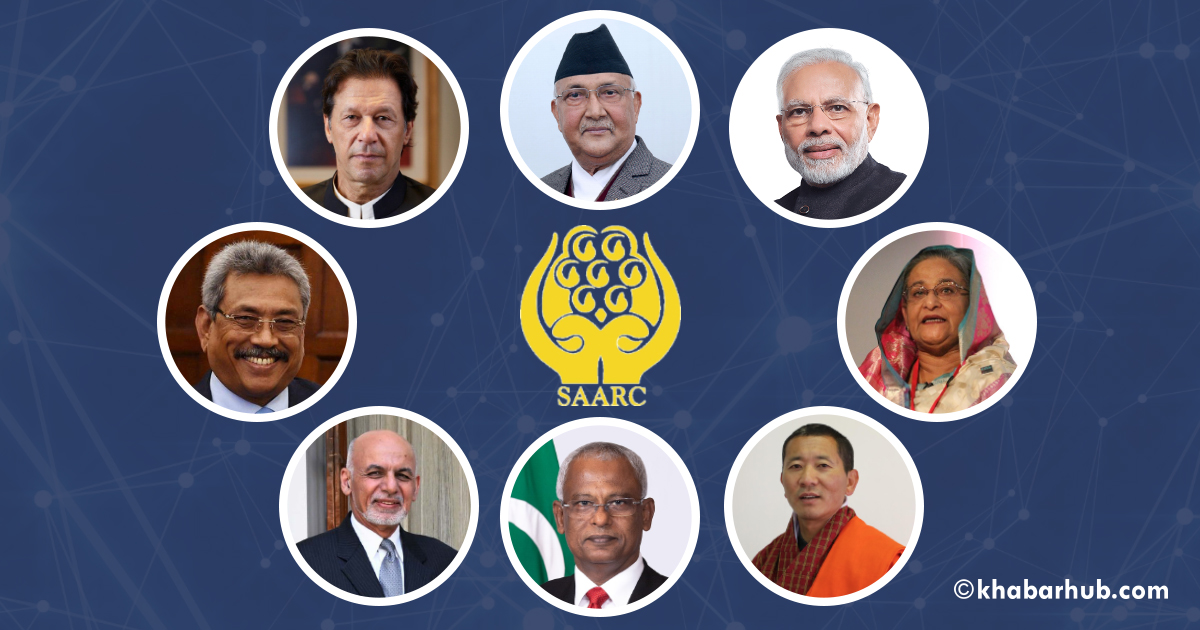0%

KATHMANDU: The question of whether the South Asian Association for Regional Cooperation (SAARC), which has been largely inactive since the last summit in Nepal in 2014, is going to be resuscitated after Sunday evening’s video-conference seems to be uncertain.
India’s Prime Minister Narendra Modi had on Friday reached out to the regional members and pitched for a video-conference to chalk out a common strategy to deal with the novel coronavirus.
SAARC has been largely inactive since a summit that was scheduled to be held in Pakistan in 2016 was suspended after an attack on an army camp at Uri in India’s Kashmir.
Since then India has been reluctant to participate in the regional summit as it has blamed Pakistan-based terrorists for the Uri attack. India has, since then, turned to Bay of Bengal Initiative for Multi-Sectoral Technical and Economic Cooperation (BIMSTEC) to bolster regional cooperation.
PM Modi’s proposal has got a response from all SAARC members, including Nepal, Afghanistan, Bhutan, Bangladesh, Sri Lanka, the Maldives, and Pakistan.
After the last summit in 2014 in Nepal, the question is whether Sunday’s video conference, though without Pakistan Prime Minister Imran Khan, will break the ice to revive the SAARC process?
Foreign experts opine that the video-conference to be held this evening has been aimed at bringing together the eight-member SAARC nations to tackle the common problem of COVID-19, which the World Health Organization (WHO) has declared it as a pandemic.
Meanwhile, Nepal’s former Foreign Minister Dr. Prakash Saran Mahat dubs Modi’s effort as a positive move to revive the stalled SAARC.
“This step will help India and Pakistan to resolve the outstanding crisis,” Dr. Mahat said while welcoming Indian PM Modi’s proposal.
Meanwhile, had the SAARC functioned smoothly, the South Asia Free Trade Agreement (SAFTA), whose ultimate aim was to put in place a full-fledged South Asia Economic Union on the lines of the EU, would have taken the region’s economy to a new height.
Meanwhile, echoing Mahat’s views, Former Foreign Minister and Ambassador Dr. Bhekh Bahadur Thapa, is hopeful that PM Modi’s proposal can be an initiative for the revival of the stalled SAARC.
The SAARC Secretariat in Kathmandu, meanwhile, has welcomed the timely proposal of PM Modi, as well as the support of other SAARC leaders. It has said that the Secretariat stands ready to work with all member states towards a strong strategy to fight the Coronavirus in the SAARC region.
“However, challenges remain,” Thapa told Khabarhub indicating at the crux of the problem of terrorism, and the conflict between India and Pakistan.
“United effort is needed to revive the regional body,” he suggests.
However, SAARC leaders seem not to be playing an effective role to revive the SAARC.
Foreign affairs expert Arun Kumar Subedi, however, has a different opinion.
“PM Modi’s initiative and SAARC are two different issues,” Subedi told Khabarhub adding, “Modi’s move is purely a humanitarian effort and has nothing to do with the revival of the regional body.”
This becomes evident that the latest move can be termed as PM Modi’s strategy to show that he hasn’t totally forgotten the regional body. But experts view this as a stunt to show that Modi, who did not make any concrete move to take SAARC forward in his first innings as India’s PM, has a role to play in SAARC.
Likewise, foreign affairs expert, Pramod Jaiswal raises skepticism over the revival of SAARC unless India and Pakistan jointly take the initiative.
“India will not be positive unless Pakistan assured the latter that it would not allow any terrorism activities in its soil,” he argues.
Former foreign secretary Dr. Dinesh Bhattarai, however, has a different opinion. He says SAARC can be revived only with the joint effort at the highest level.
Nepal’s former ambassador to India, Deep Kumar Upadhyaya says this video conference can be the first step to revive SAARC.
PM Modi’s proposal has got a response from all SAARC members, including Nepal, Afghanistan, Bhutan, Bangladesh, Sri Lanka, the Maldives, and Pakistan.
Islamabad, too, has said it will participate in the video conference aimed at combating the fast-spreading coronavirus pandemic.
PM Modi’s pitch for a joint strategy among SAARC member states to combat coronavirus shoulders significance as India has been distancing itself from the SAARC citing terrorism.
The SAARC Secretariat in Kathmandu, meanwhile, has welcomed the timely proposal of PM Modi, as well as the support of other SAARC leaders. It has said that the Secretariat stands ready to work with all member states towards a strong strategy to fight the Coronavirus in the SAARC region.